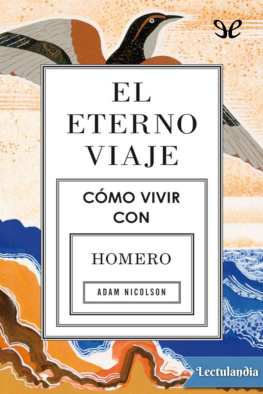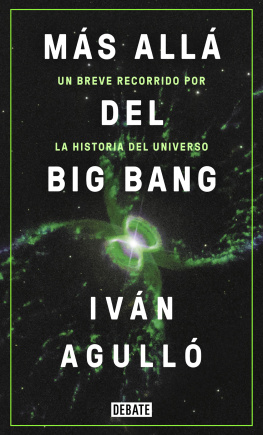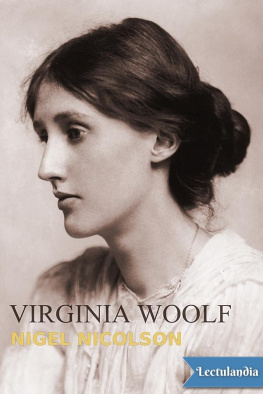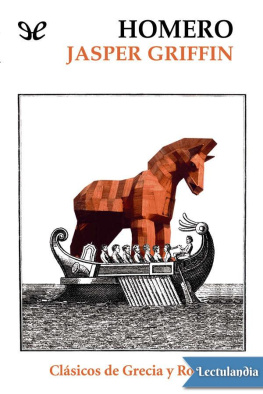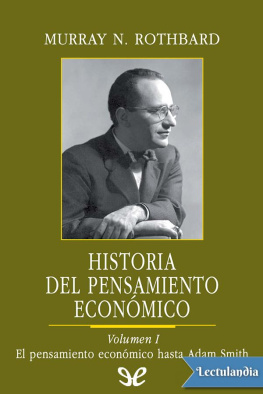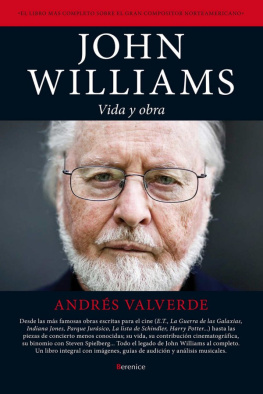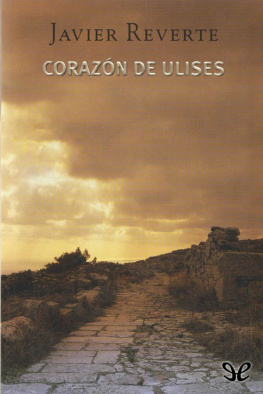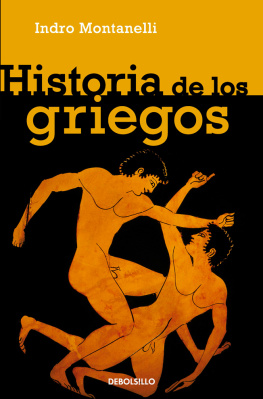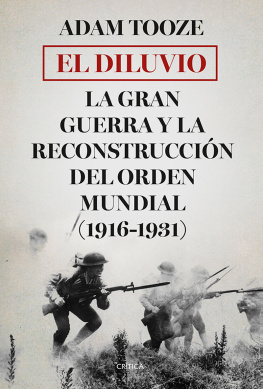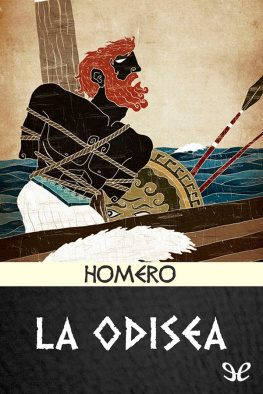
AGRADECIMIENTOS
Deseo dar las gracias a todo el mundo que, en el transcurso de los años, de manera consciente o inconsciente, me ha ayudado a avanzar por los enmarañados senderos de Homero.
George Fairhurst, Vassilis Papadimitriou, Gavin Francis, Robert Macfarlane, Ali Serle, Juliet Nicolson, Rebecca Nicolson, Aurea Carpenter, Andrew Palmer, Paul Johnston, Alexandra Chaldecott, Ivan Samarine, Jim Richardson, Oliver Payne, Claire Whalley, Koenraad Kuiper, Liz Broomfield, Mary Keen, Laura Beatty, Martin Thomas, Matthew Reynolds, Matthew Rice, Nicholas Purcell, Philip Marsden, Robert Sackville-West, Richard Klein, Sarah Longley, Sigrid Rausing, Stephen Romer, Thomas Pennybacker, Casey Dué, David Sansone, Garry Fabian Miller, Charlie Burrell e Issy Burrell.
Sofka Zinovieff es el mejor amigo, guía y acompañante que nadie podría desear. Tim Dee me llevó a toda suerte de lugares homéricos de un modo que cambió mi forma de entender a Homero. Caroline Alexander conversó conmigo enérgicamente acerca de mis ideas homéricas durante muchas horas iluminadoras. David Anthony me proporcionó información sumamente valiosa acerca del mundo de las estepas.
Deseo expresar mi agradecimiento especial a Kylie Richardson del Trinity Hall, Cambridge, y a Matt Hosty, del Jesus College, Oxford, por el esmero que pusieron en evitar que incurriera en el peor de los errores. Huelga decir que no tienen responsabilidad alguna por todos los errores que haya podido cometer.
En William Collins, Susan Watt, Helen Ellis, Robert Lacey y Joseph Zigmond no han escatimado en proporcionarme apoyo y conocimientos expertos. Arabella Pike es la clase de editora que cualquier autor anhela: cuidadosa, considerada, alentadora, reactiva, generosa y, por encima de todo, capaz de compendiar el mejor libro que siempre parece acechar bajo la superficie. Mi más sincera gratitud también a Hilary Bird, por recopilar el índice.
George Capel ha sido mi amiga y aliada incondicional durante toda esta aventura, y me faltan palabras para expresarle toda mi gratitud.
Por encima de todo, me gustaría dar las gracias a Sarah y a mis hijos por aceptar a Homero, que no es el invitado más fácil en ningún hogar, y durante tanto tiempo. Este libro va dedicado a ellos.
Sarah Raven
Molly Nicolson
Rosie Nicolson
Benedict Nicolson
William Nicolson
Thomas Nicolson

BIBLIOGRAFÍA
TEXTOS GRIEGOS
The Iliad. Con traducción paralela al inglés de A. T. Murray. Loeb/ Harvard University Press, 1925.
The Iliad. Con traducción paralela al inglés de W. F. Wyatt. Loeb/ Harvard University Press, 1999.
The Odyssey. Con traducción paralela al inglés de A. T. Murray y revisión de G. E. Dimock. Loeb/Harvard University Press, 1999.
Hesiod, Homeric Hymns, Epic Cycle, Homerica, con traducción paralela de H. G. Evelyn -White. Loeb/Harvard University Press, 1914.
«Lives of Homer». En: Homeric Hymns. Con traducción paralela al inglés de M. L. West. Loeb/Harvard University Press, 2003.
TRADUCCIONES
Allardyce Nicoll (ed.). Chapman’s Homer: The Iliad. Princeton University Press, 1956, pág. 198.
Alexander Pope. The Iliad. 1715-1720.
Alexander Pope, con W. Broome y E. Fenton. The Odyssey. 1726.
T. E. Shaw. The Odyssey. Londres, 1932.
Homero. The Odyssey. Traducción de E. V. Rieu y revisión de D. C. H. Rieu. Londres, 1946.
Richmond Lattimore. The Iliad of Homer. Chicago, 1951.
Richmond Lattimore. The Odyssey. Nueva York, 1967.
Homer, The Iliad. Traducción al inglés de Robert Fagles. Nueva York, 1990.
Homer, The Odyssey. Traducción al inglés de Robert Fagles, 1996.
TRADUCCIONES AL CASTELLANO EMPLEADAS EN ESTA TRADUCCIÓN
Homero. Ilíada. Edición bilingüe de Francisco Javier Pérez. Madrid: Abada Editores, 2012.
Homero. Ilíada. Traducción de Luis Segalá y Estalella. Barcelona, Austral, 2012.
Homero. Odisea. Traducción de Fernando Gutiérrez. Barcelona, Debolsillo, 2013.
ADAPTACIONES
Christopher Logue. War Music. 2001.
Alice Oswald. Memorial: An Excavation of the Iliad. 2011.
SOBRE LA DATACIÓN DE HOMERO
Sir Moses Finley. El mundo de Odiseo. Madrid: Fondo de Cultura Económica de España, 1980.
Ian Morris. «The Use and Abuse of Homer». En: Classical Antiquity, vol. 5, n.º 1 (abril de 1986), págs. 81-138.
Gregory Nagy. Homeric Questions, 1996.
Susan Sherratt. «Archaeological Contexts». En: John Miles Foley (ed.), A Companion to Ancient Epic. Blackwell, 2005, págs. 119-142.
John Miles Foley (ed.). A Companion to Ancient Epic. Blackwell, 2005.
EL FRESCO DE PILOS
Carl W. Blegen. «The Palace of Nestor Excavations of 1955». En: American Journal of Archaeology, vol. 60, n.º 2 (abril de 1956), págs. 95-101.
Mabel L. Lang en: The Palace of Nestor at Pylos in Western Messenia, Vol. II The Frescoes. Princeton, 1969.
Reseña de Emily Vermeule sobre el texto de Lang en The Art Bulletin, vol. 52, n.º 4, diciembre de 1970, págs. 428-430.
Casey Dué. «Epea Pteroenta: How We Came to Have our Iliad». En Casey Dué (ed.). Recapturing a Homeric Legacy: Images and Insights From the Venetus A Manuscript of the Iliad. Center for Hellenic Studies, Washington, 2009, págs. 19-30.
SEFERIS
Giorgos Seferis. Antología poética. Traducción de Pedro Ignacio Vicuña. Madrid: Visor Libros, 2012.
ANTROPOLOGÍA DE HOMERO
Carol Dougherty. The Raft of Odysseus: The Ethnographic Imagination of Homer’s Odyssey. Oxford, 2001.
Mary W. Helms. Ulysses’ Sail: An Ethnographic Odyssey of Power, Knowledge and Geographical Distance. Princeton University Press, 1988.
CRÍTICA Y RECEPCIÓN
Matthew Arnold. On Translating Homer: Three Lectures Given at Oxford. Longman, Green, Longman, Roberts, 1861, disponible online en:
http://www.victorianprose.org/.
Kenneth Rexroth. Cita con los clásicos. Traducción de Federico Corriente Basús. Logroño: Pepitas de Calabaza Editorial, 2014.
Robert Baldick (ed. y trad.). The Goncourt Journals by Edmond and Jules de Goncourt. New York Review of Books, 1962 (2007).
Nicholas Boyle. Goethe: Revolution and Renunciation 1790-1803 . Oxford University Press, 2003, pág. 265.
Matthew Reynolds. The Poetry of Translation: From Chaucer and Petrarch to Homer and Logue. 2011.
Samuel Johnson. «Life of Pope» (1779). En: The Works of the English Poets, from Chaucer to Cowper, J. Johnson, 1810, vol. 12, pág. 112.
Penelope Murray, T. Dorsch. Classical Literary Criticism: Plato: Ion; Republic 2-3, 1; Aristotle: Poetics; Horace: The Art of Poetry; Longinus: On the Sublime. 2000, pág. 1.
Rodelle Weintraub y Stanley Weintraub. «Chapman’s Homer». En: The Classical World, vol. 67, n.º 1 (septiembre-octubre de 1973), págs. 16-24 [artículo sobre T. E. Lawrence].
KEATS
Andrew Motion. Keats. Londres, 1997.
Charles Cowden Clarke. «Recollections of Keats», 1861. En: Recollections of Writers (1878), págs. 120-157.
Andrew Laing. The English Poets: Selections with Critical Introductions. Thomas Humphry Ward (ed.), 1880, vol. 1, pág. 510.
S. T. Coleridge. «Notes on Chapman’s Homer». En: Notes and Lectures Upon Shakespeare and Some of the Old Poets and Dramatists: With Other Literary Remains of S. T. Coleridge , vol. 2, pág. 231.
J. P. Mallory y D. Q. Adams. The Oxford Introduction to Proto-Indo-European and the Proto-Indo-European World (Oxford Linguistics). 2006, pág. 136.
J. G. Lockhart. «On the Cockney School of Poetry, No. V.». En: Blackwood’s Edinburgh Magazine, abril de 1819.
TRANSMISIÓN DEL TEXTO
Joh. Baptista Caspar d’Ansse de Villoison. Homeri Ilias ad Veteris Codicis Veneti Fidem Recensita. 1788.
Página siguiente
